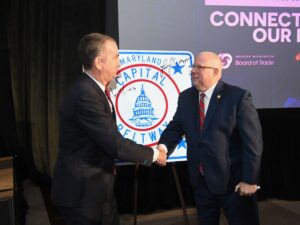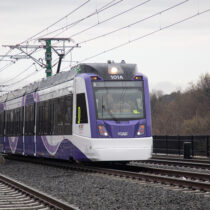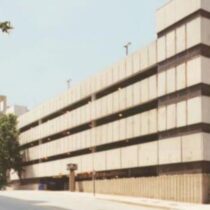
Gov. Ralph Northam, left, and Gov. Larry Hogan at a D.C. event to announce plans to widen the American Legion Bridge.
The Maryland and Virginia governors have agreed on moving forward with a new American Legion Bridge as well as funding formulas on how the costs will be distributed, according to Gov. Larry Hogan’s office.
The bridge, which connects Montgomery County with Northern Virginia, has eight lanes with 235,000 vehicles crossing the Potomac River daily. It’s considered one of the region’s worst bottlenecks.
In their joint announcement, Gov. Larry Hogan and Gov. Ralph Northam of Virginia said the project would cut commuting time in half for many travelers, reduce congestion in the regular lanes by 25 percent, provide 40 percent more lane capacity over the old bridge, and include bicycle and pedestrian paths over the river.
The project will replace the existing lanes in each direction across the Potomac River and add two new express lanes in each direction for about 3 miles between the George Washington Memorial Parkway in Virginia to the vicinity of River Road in Maryland. No cost estimate is available, Maryland Transportation spokeswoman Erin Henson said. The project could start in 2022, she said.
Hogan’s office also says:
- New bicycle and pedestrian access will connect trails on both sides of the Potomac River.
- The project is being designed predominantly within the footprint of the existing bridge and right of way to minimize impact to travelers, the environment and surrounding communities.
- No homes or businesses are expected to require relocation.
“A bipartisan, commonsense, interstate agreement such as this has eluded elected leaders throughout the region for many decades,” Gov. Larry Hogan said in a statement. “Together with our partners in Virginia, we are building a foundation for even greater economic growth, greater opportunity for our citizens, and advancing real, lasting, transformative improvements for the entire Washington metropolitan region.”
Henson said the bridge project will be part of a public-private partnership, called a P3, that includes widening I-495 to I-95, Henson said. A P3 uses private capital to finance projects — a P3 is financing the construction of the Purple Line. In return, the companies involved in the P3 receive toll revenues.
County Executive Marc Elrich was happy Hogan focused on the American Legion Bridge, but had concerns about widening the Capital Beltway.
The project complements ongoing plans by both governors — advancing a region-wide vision for a seamless network of reliable travel options around the Capital Beltway, and along Interstates 270 and 95, 395, and the George Washington Parkway.
Under the “Capital Beltway Accord,” Maryland will cover 79 percent of the cost of the general purpose lanes on the new bridge, 50 percent of the express lanes on the new bridge, and 100 percent of the southbound express lanes and general purpose lanes from River Road to the George Washington Parkway.
Virginia will cover 21 percent of the general purpose lanes on the new bridge, 50 percent of the express lanes on the new bridge, and 100 percent of the northbound express lanes and general purpose lanes from the George Washington Parkway to River Road.
“Our teams have identified a way to fix one of the worst traffic hot spots in the country,” Northam said in the statement. “This demonstrates what can get done when leaders come together to find shared solutions to tough regional problems. This is about helping people see their families more, grow their businesses, and further unlock the region’s vast economic potential.”
According to Hogan’s office, the American Legion Bridge has been operating beyond its capacity for nearly four decades. Opened in 1962, the bridge has seen its daily traffic grow 390 percent since.


Comments are closed.